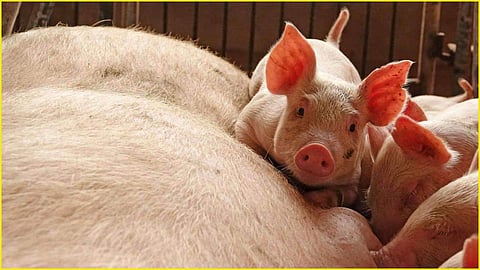

A strain of coronavirus which causes acute diarrhea in piglets may have the potential to spread to humans as well, according to a new study which says the virus could "negatively impact the global economy and human health. " According to the researchers, including those from the University of North Carolina (UNC) at Chapel Hill in the US, the coronavirus strain, known as swine acute diarrhea syndrome coronavirus (SADS-CoV), emerged from bats and has infected herds of pigs throughout China since it was first discovered in 2016.
They said outbreaks of such an illness have the potential to wreak economic havoc in many countries across the globe that rely on the pork industry. In the new study, published in the journal PNAS, the scientists conducted lab tests to assess the potential threat from SADS-CoV to people, and found that the virus efficiently replicates in human liver and gut cells, as well as airway cells.
"Efficient growth in primary human lung and intestinal cells implicate SADS-CoV as a potential higher-risk emerging coronavirus pathogen that could negatively impact the global economy and human health," the scientists wrote in the study.
Though it is in the same family of viruses as the betacoronavirus SARS-CoV-2, which causes the respiratory illness COVID-19 in humans, the scientists said SADS-CoV is an alphacoronavirus that causes gastrointestinal illness in swine.
They said the virus causes severe diarrhea and vomiting and has been especially deadly to young piglets.
SADS-COV is also distinct from two circulating common cold alphacoronaviruses in humans, HCoV-229E and HCoV-NL63, they added.
"While many investigators focus on the emergent potential of the betacoronaviruses like SARS and MERS, actually the alphacoronaviruses may prove equally prominent -- if not greater -- concerns to human health, given their potential to rapidly jump between species," said study co-author Ralph Baric, a professor of epidemiology at UNC-Chapel Hill.
While SADS-CoV has not been known to affect humans to-date, the researchers said coronavirus strains found in animals have the potential to infect humans as well -- an effect known as spillover.
According to the scientists, a wide range of mammalian cells, including primary human lung and intestinal cells, are susceptible to SADS-CoV infection, with the virus showing a higher rate of growth in intestinal cells found in the human gut, unlike the novel coronavirus which primarily infects lung cells.
While studies have suggested that cross-protective immunity often prevents people from contracting many coronaviruses found in animals, the researchers believe humans have not yet developed such a defence to SADS-CoV.
"SADS-CoV is derived from bat coronaviruses called HKU2, which is a heterogenous group of viruses with a worldwide distribution," said Caitlin Edwards, another co-author of the study.
"It is impossible to predict if this virus, or a closely related HKU2 bat strain, could emerge and infect human populations," Edwards said.
However, given the broad host range of SADS-CoV, coupled with its ability to replicate in primary human lung and gut cells, the researchers believe the virus demonstrates "potential risk for future emergence events in human and animal populations.
" Edwards and her colleagues tested the broad-spectrum antiviral remdesivir as a potential method of treatment for the infection, and the preliminary results showed that it had robust activity against SADS-CoV.
However, the scientists cautioned that more testing is necessary on additional cell types, and in animals to confirm these findings.
"Promising data with remdesivir provides a potential treatment option in the case of a human spillover event," Edwards said.
"We recommend that both swine workers and the swine population be continually monitored for indications of SADS-CoV infections to prevent outbreaks and massive economic losses," she added.
While surveillance and early separation of infected piglets provide an opportunity to mitigate larger outbreaks and the potential for spillover into humans, Baric said vaccines may be key for limiting global spread and human emergence events in the future.
